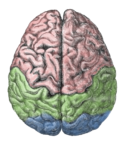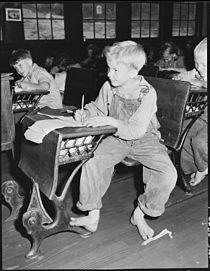Geared for Parents and Teachers: Kids learn to read best, not when they complete worksheets and drills, but when they see ideas in the world they want to discover, and they realize reading is one powerful way to help them do this. This blog helps provide them intriguing books and science/world ideas, encourage their discussions, and hopefully inspire them to dig deeper.
Monday, March 4, 2013
Here's Hoping Common Core Keeps Its Novel Edge
An award-winning principal who wrote a book all about the positives of Common Core is beginning to have second thoughts. It appears that some districts and/or states apparently view Common Core in much the same way as No Child Left Behind. It's a complete shame. Common Core promises invigorating classrooms where students delve into real-world projects that encourage them to use all their academic skills to solve the project. This is so like the model John Dewey advocated 50 years ago, and is much the reason I entered education. So now this worries me -- within a one or two-year turn around, can our states truly accept Common Core for all the excitement and dynamic learning it can provide? Exactly how will your state/district translate Common Core for your child? After all, isn't a riveting classroom the best one to learn in?
Sunday, March 3, 2013
Brain-Based Learning --- How Amazing It All Is
Okay, the title I gave this post is really for me. I had heard of brain-based learning a good 15 years ago, and just figured it was another "pop" reading intervention that would soon fade. What I did not know was brain-based learning was based on the fMRIs, new to the field of learning in those days but oh! what it allowed researchers to do. My own stupidity and loss -- I didn't try to educate myself on the work, so now, 15 years later, I came across two books on the topic and became mesmerized. Maryanne Wolfe's Proust and the Squid, a professor from Tufts, takes an educational view toward the field; I found her book enthralling, with detailed research that answered so much. Stanislas Dehaeine's Reading In the Brain is more science-based, but even as I floundered on some of his explanations, I was just as riveted to his words.
Friday, March 1, 2013
Want to Get Your Kids Reading? Take Her To See the Authors
The biggest known secret around is this -- if you want to get your child reading, help her school bring in a (good!) author. There's something magical about putting a face to a book, to hear the author tell how he developed the idea for the book, that ignites the students listening to want to read his book. And then his next book, and other books...
Now bringing in some of the major authors can cost big bucks -- you have to foot the bill of the airfare, the lodgings, and, of course, the honorarium. But many cities have excellent children's authors right in their midsts. You also might be able to work together with a local bookstore or book event that is already bringing in an author.
Just be sure to screen the books of any author you select. Some, although calling themselves "children's authors," are not. And some other authors really don't write well. (It often depends who published their book. And if they are self-published, how much screening their books went through. The best way to determine quality is simply to read the book(s) yourself.)
Or if bringing in an author doesn't work for you, check around and see if any are coming to your town soon. Your child will love seeing an author of a book they admire. They will.
Now bringing in some of the major authors can cost big bucks -- you have to foot the bill of the airfare, the lodgings, and, of course, the honorarium. But many cities have excellent children's authors right in their midsts. You also might be able to work together with a local bookstore or book event that is already bringing in an author.
Just be sure to screen the books of any author you select. Some, although calling themselves "children's authors," are not. And some other authors really don't write well. (It often depends who published their book. And if they are self-published, how much screening their books went through. The best way to determine quality is simply to read the book(s) yourself.)
Or if bringing in an author doesn't work for you, check around and see if any are coming to your town soon. Your child will love seeing an author of a book they admire. They will.
Teaching Religion In Public Schools
An aside: When I first came to Kansas, I taught in a small, rural, 4-classroom/8-grade level elementary school. When I heard we'd be having religion class in the middle of the day, I was enthused and told the nuns who came by to visit all about how I had divided my social studies classroom last year in Texas into six groups, with each group studying one major world religion. The nuns didn't say a word.
I was new to the school. Their religion class was taught to the Catholic children in my classroom; any non-Catholics (I had one Protestant) could remain in the classroom with me during that time. (This is how public education is tweaked in some rural settings, I came to learn.) I don't know what that one boy and I did during that time, but I do remember it wasn't religion. Maybe an extra art time?
Thursday, February 28, 2013
Teachers: Many Feeling They Aren't Ready For Common Core
An article in Education Week tells how many teachers are feeling overwhelmed with the idea of teaching Common Core. And they have every reason to feel that way. I find the framework of Common Core -- and where it wants education to head -- incredibly invigorating. However, to translate that theory into practice will take extensive work, and unless teachers are given extensive -- let's repeat that, extensive -- time to digest the core of Common Core, the strength of it will simply disappear into an new reading series, a book of handouts, a series of tests. Common Core is leading our students into digging far deeper (and in ways far more clever) than we have demanded of our students in the past. But are we, the leaders of this movement, up to this? Of course, but only if teachers are given time to experiment, learn, and grow into this new framework.
And parents, too, have to be a part of the new learning, of course. As with "new" math, their children will be coming home with assignments that will look far different from what you parents have seen in the past -- or grew up with themselves. So once we teachers puzzle this all out, it will be time to help you guys along.
Common Core has so much to offer. Let's all do it right.
Friday, February 22, 2013
Cry Of "I'm Bored"
Recent research cited in Education Today states that the student cry of "I'm bored" may really be that the child is finding the work far too difficult, and instead of confessing so (or perhaps not knowing so), the child mislabels her frustrations. A good thing for us teachers and you parents to think about when we hear this refrain...
Tuesday, January 29, 2013
American Library Association Children's Book Awards
So the winners for the Newbery, Caldecott, and others are announced. They are the following:
Newbery: The One and Only Ivan by Katherine Applegate
Caldecott: This Is Not My Hat
Coretta Scott King: Hand In Hand: Then Black Men Who Changed America by Andrea Davis Pinkney and Brian Pinkney
Printz: In Darkness by Nick Lake
Schneider Family Book Award: Back to Front and Upside Down! written and illustrated by Claire Alexander
Pura Belpré (Illustrator) Award: Martín de Porres: The Rose in the Desert, illustrated by David Diaz
Wednesday, January 16, 2013
Preschools -- Helpful to the Needy or Not?
President Obama, in recent talks, has strongly advocated preschools for all underserved four-year olds. At first blush, I was all in favor of it -- our own school district has a preschool for needy children that is free to the families, and I've seen first hand what those children learn, now much better they come to kindergarten than how I assume they would have arrived. But then the studies were reported, too, some saying that the gains those children make even out by third grade, that they are no more advanced than other children who did not have that advantage. Now, hey, that couldn't be right, could it? Or is it?
I think we need to see a full accounting of those studies. With our economy as it is, I doubt free preschools will find any traction. But we do need to know.
Subscribe to:
Comments (Atom)

.jpg/800px-Religios_collage_(large).jpg)


